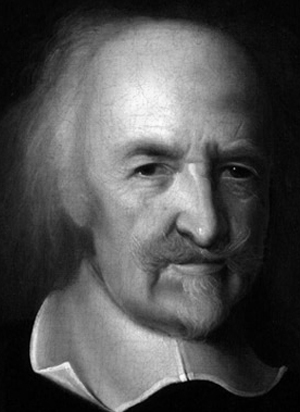
Thomas Hobbes of Malmesbury (April 5, 1588 – December 4,1679), in some older texts Thomas Hobbs of Malmsbury, was an English philosopher, best known today for his work on political philosophy. His 1651 book Leviathan established the foundation for most of Western political philosophy from the perspective of social contract theory. (Click here for full Wikipedia article)
-----
All crimes are indeed sins, but not all sins crimes. A sin may be in the thought or secret purpose of a man, of which neither a judge, nor a witness, nor any man, can take notice.
Another doctrine repugnant to civil society, is that whatsoever a man does against his conscience, is sin; and it dependeth on the presumption of making himself judge of good and evil. For a man's conscience and his judgement are the same thing, and as the judgement, so also the conscience may be erroneous.
Corporations are may lesser commonwealths in the bowels of a greater, like worms in the entrails of a natural man.
Courage may be virtue, where the daring act is extreme; and extreme fear no vice, when the danger is extreme.
Desire to know how and why,-curiosity: so that man is distinguished not only by his reason, but also by this singular passion, from all other animals.
Do not that to another, which thou wouldst not have done to thyself.
During the time men live without a common power to keep them all in awe, they are in that conditions called war; and such a war, as if of every man, against every man.
Every man calleth that which pleaseth, and is delightful to himself, good; and that evil which displeaseth him.
Give an inch, he'll take an ell.
I put for a general inclination of all mankind, a perpetual and restless desire of power after power, that ceaseth only in death.
Intemperance is naturally punished with diseases; rashness, with mischance; injustice; with violence of enemies; pride, with ruin; cowardice, with oppression; and rebellion, with slaughter.
It is fairer to tax people on what they extract from the economy, as roughly measured by their consumption, than to tax them on what they produce for the economy, as roughly measured by their income.
Leisure is the mother of philosophy.
Man gives indifferent names to one and the same thing from the difference of their own passions; as they that approve a private opinion call it opinion; but they that mislike it, heresy: and yet heresy signifies no more than private opinion.
Moral philosophy is nothing else but the science of what is good, and evil, in the conversation, and society of mankind. Good, and evil, are names that signify our appetites, and aversions; which in different tempers, customs, and doctrines of men, are different.
No arts; no letters; no society; and which is worst of all, continual fear, and danger of violent death: and the life of man, solitary, poor, nasty, brutish and short.
Such truth as opposeth no man's profit nor pleasure is to all men welcome.
The fault lieth altogether in the dogmatics, that is to say, those that are imperfectly learned, and with passion press to have their opinion pass everywhere for truth.
The notions of right and wrong, justice and injustice have there no place. Where there is no common power, there is no law, where no law, no injustice. Force, and fraud, are in war the cardinal virtues.
The praise of ancient authors proceeds not from the reverence of the dead, but from the competition and mutual envy of the living.
The privilege of absurdity; to which no living creature is subject but man only.
The secret thoughts of a man run over all things, holy, profane, clean, obscene, grave, and light, without shame or blame.
The source of every crime, is some defect of the understanding; or some error in reasoning; or some sudden force of the passions.
The sudden disappointment of a hope leaves a scar which the ultimate fulfilment of that hope never entirely removes.
Categories: Quotes of the day, Thomas Hobbes
![]() Subscribe
[Home]
[Commentwear]
[E-Mail KGB]
Subscribe
[Home]
[Commentwear]
[E-Mail KGB]
Older entries, Archives and Categories Top of page

















